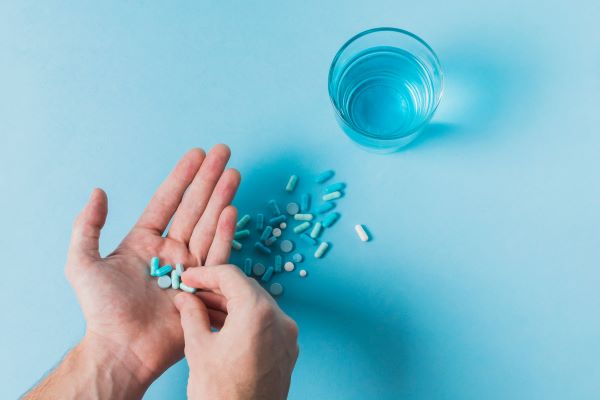
Counterfeit medications are a growing problem that can undermine medical treatment, and all physicians can help prevent their spread by asking patients simple questions.
Neil Campbell, senior director of strategic intelligence, planning, and analytics at Pfizer Inc., shared that message with physicians at the general session of the Texas Medical Association’s Winter Conference on Saturday, Jan. 28, in Austin.
Talk about counterfeit medicines tends to conjure up images of illicit medicines laced with fentanyl and other opioids, Mr. Campbell told physicians. While that image is based in reality, all types of medications are regularly counterfeited – meaning unscrupulous entities deliberately and fraudulently mispresent the medications’ identity, composition, or source.
Pfizer’s well-known COVID-19 vaccine has not been counterfeited much because the distribution of it has been tightly controlled, he said. But since 2004, Pfizer has prevented about 302 million doses of counterfeit medications of all kinds from reaching patients worldwide. The entities producing those counterfeits prey on patients’ need for medications that are expensive or in short supply.
“They’re antiviral [medications], they’re vaccines, they’re oncology medicines, dermatology medicines – everything is open game as long as they can make a profit,” Mr. Campbell warned.
This illegal business, which the World Health Organization estimates makes about $200 billion per year globally, regularly affects Texas physicians and patients, he cautioned. In a snap phone poll of physicians attending the presentation, about 25% answered yes when asked, “Have you ever encountered a counterfeit medication?”
Contributing to the proliferation, the growth of electronic commerce and the COVID-19 pandemic have made patients comfortable with ordering medications online, Mr. Campbell said. That practice is fine if patients use reputable websites. Counterfeiters target patients who are hoping to pay less for high-demand medications. They frequently claim to be in based in Canada because Americans view it as a reputable source for low-cost medications.
“Your patients are all at risk, and if they have a phone or a credit card, there’s the potential that they may get lured into thinking they’re getting the real thing when they’re getting counterfeit.”
Physicians can help patients avoid this mistake by asking patients where they plan to buy their medications and steering them toward either a brick-and-mortar pharmacy or a reputable online source.
A second snap phone poll asked physicians: “Have you asked a patient where they purchase their medication if a treatment is no longer working?” About 34% responded that they have.
More physicians should follow up with patients in these situations, Mr. Campbell said.
“Commit just a moment to asking your patients where they’re getting their medicines from, if they’re not getting the effective, therapeutic benefit they thought they were getting when you prescribed it,” he said.
In 2017, the National Association of Boards of Pharmacy (NABP) reviewed more than 11,000 websites that sell prescription medicines and found that nearly 96% of them are “operating illegally, out of compliance with state and federal laws or NABP patient safety and pharmacy practice standards.”
Pfizer has worked with law enforcement to close about 15,000 websites worldwide selling illicit medications over the past five years, but for every three that close, at least one more starts up somewhere else, Mr. Campbell reported. In part, that is because legal punishments for selling counterfeit legal medications are not as tough as they are for selling illicit narcotics.
“If you sell a narcotic like cocaine, you’re going to go to jail for a really long time,” he said. “[Criminals] realize, ‘Hey, I’ll sell a counterfeit, and will maybe make a few million bucks, and I’ll spend a few months in jail.’ At that point, it’s really worth it.”
Houston radiologist Richard Strax, MD, questioned Mr. Campbell about the impact that high pharmaceutical prices have on driving patients toward counterfeit medications.
“Unlike people who are out there shopping for the price on a [television] or something, some of the people who fall for counterfeit medicines are people who desperately need a medicine that is way beyond their ability to pay,” Dr. Strax said. “Is there a need to control prices so that people can afford these medicines and not have to go to a counterfeit form?”
Pfizer has heard similar complaints from patients and “the industry at large realizes there’s an issue here,” Mr. Campbell acknowledged.
He added that typically inexpensive medications are frequently counterfeited as well. “The price of the medicine is a factor, but it’s not the [main] driver. The driver is demand and its availability.”
He advised physicians with patients in need of Pfizer products to go to the Pfizer RxPathways webpage to see if they qualify for either discounted or free medications.
Austin emergency physician Robert Emmick, MD, chair of TMA’s Committee on Physician Distribution and Health Care Access, asked if the problem with counterfeit medications is “mainly an issue with efficacy ... or with unintended side-effects.”
All counterfeit medications are potentially dangerous because their makers frequently alter pharmaceutical ingredients, and the medicines are often made in substandard or unclean conditions, Mr. Campbell replied. But the main issue is not that counterfeit medications will hurt someone right away but that they undermine the patient’s treatment.
“Every pharmaceutical company is aware that while it may not kill you immediately, it has the risk of killing you over time for a number of different reasons,” he said.
Little Elm family medicine specialist Trevor Huber, DO, asked if physicians and patients can send medicines they suspect of being counterfeit to be tested. Mr. Campbell replied physicians and patients can call Pfizer at (800) 879-3477 with questions about counterfeits and to set up testing for suspected counterfeit medications. They also can email GSOCwatchroom@pfizer.com.
The Food and Drug Administration also provides information on how to avoid purchasing counterfeit medications, as does NAPB.